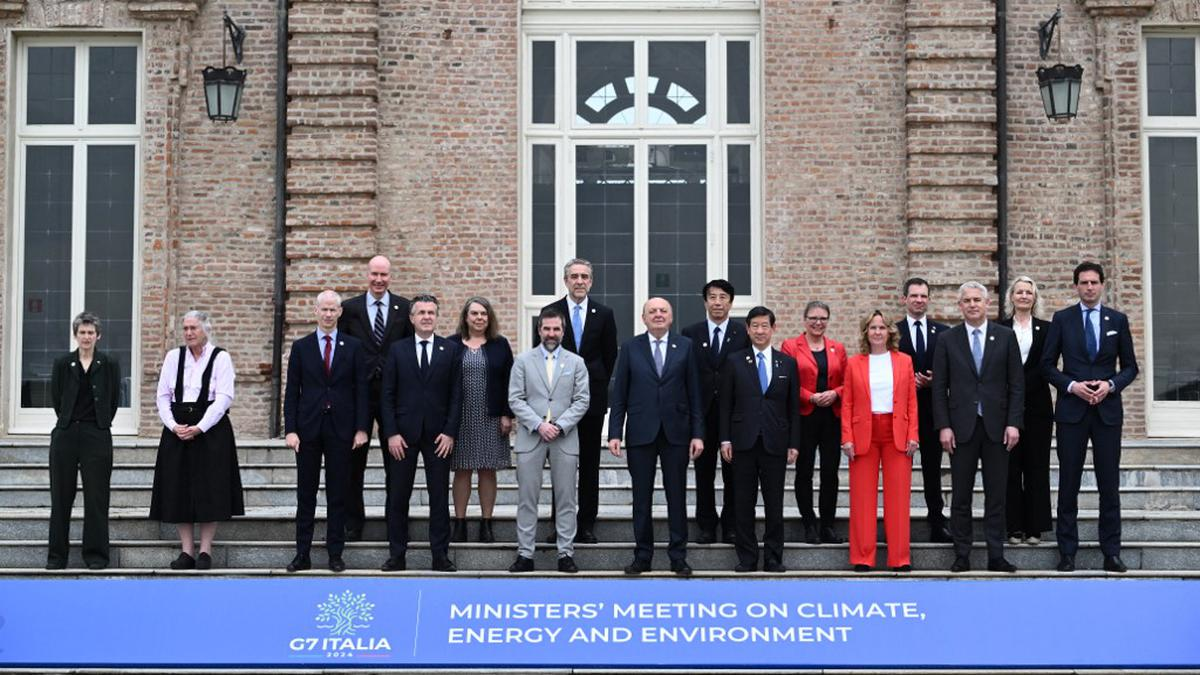Description

Disclaimer: Copyright infringement not intended.
Context:
- G7 energy ministers on April 29 discussed a possible time frame for phasing out coal-fired power plants, as the UN warned “excuses” for failing to take bold actions on climate change were “not acceptable”.
About the recent G7 meeting
- The Group of Seven meeting was held in Turin.
- Energy and ecological transition ministers from the G7 were on the first of two-day talks, on the issue of committing to a common target of shutting down coal-fired power plants.
- G7 energy ministers discussed a possible time frame for phasing out coal-fired power plants.
- Ministers are discussing “renewables, energy efficiency, phasing out fossil fuels” as well as “research for next-generation nuclear power, fusion, the circular economy, critical raw materials, biofuels.
- It is the first big political session since the world pledged at the UN’s COP28 climate summit in December to transition away from coal, oil, and gas.
The outcome of the meeting:
- They came close to agreeing to commit to coal-fired power plants “in the first half of the 2030s”.
- The latest G7 draft released after the meet commits to “phase out existing unabated coal power generation in our energy systems during the first half of 2030s or in a timeline consistent with keeping a limit of 1.5°C temperature rise within reach, in line with countries’ net zero pathways”.
Significance:
- A fixed time frame would be hailed as an important step.
- Rome, which holds the G7 rotating presidency this year, wants Turin to be “a strategic link” between last year’s UN climate talks and COP29, which will take place in November in Azerbaijan.
Criticisms
- A new report by a global climate institute shows the G7 -- which includes Canada, France, Germany, Italy, Japan, the UK, and the US -- is falling far short of its targets.
- Together the G7 makes up around 38 percent of the global economy and was responsible for 21 percent of total greenhouse gas emissions in 2021, according to the Climate Analytics Policy Institute.
- Criticism directed at the G7 countries for their ongoing dependence on fossil fuels, particularly coal. Oil Change International noted that G7 countries provided significant public finance for fossil fuels, surpassing investments in clean energy.
- Not one member of the group is on track to meet existing emission reduction targets for 2030.
- G7 countries have been slow and insufficient in providing climate finance to developing nations agreed under the Paris Agreement targets. Oxfam reports that only 20% of climate finance from rich countries in 2019 was allocated for adaptation, with minimal reaching least developed countries.
- Italy is a climate change hotspot vulnerable to wildfires, drought, and glacier retreat.
- Most of the G7 member countries fail to update nationally determined contributions (NDCs) and Paris Agreement targets.
- Hundreds of protesters demonstrated in Turin against the G7 leaders whom they accuse of failing future generations.
- Environmentalists demanded to know how the energy and environment ministers intend to follow through on pledges, such as the agreement at COP28 in Dubai to double energy efficiency rates and triple renewable capacity by 2030.
Way ahead for G7 countries:
- Islands being swallowed by the seas due to sea level rise, and record-breaking temperatures is making essential activities like farming unbearable. In this light, G7 countries should adopt “significantly more ambitious plans to cut emissions”.
- G7 needs to discuss “innovative” financing models amid calls for more accessible finance for vulnerable countries.
- “’ Challenging budget conditions’ should not be an excuse for failing to deliver substantial new public climate finance pledges.
- The highly industrialized countries should use their political clout, wealth, and technologies to end fossil fuel use.
About G7 countries:
https://www.iasgyan.in/daily-current-affairs/group-of-seven-g-7
Source
https://www.thehindu.com/sci-tech/energy-and-environment/g7-eyes-possible-end-date-for-coal-fired-power-plants/article68122404.ece
|
PRACTICE QUESTION
Q) Consider the following statements about G7 countries:
- The Group of Seven meeting recently held in Turin is the first big political session since the world pledged at the UN’s COP28 climate summit to transition away from coal, oil, and gas.
- Together the G7 is responsible for 40 percent of total greenhouse gas emissions in 2021.
- More than 50% of climate finance from rich countries in 2019 was allocated for adaptation.
How many of the above statements is/are correct?
A.Only one
B.Only two
C.All three
D.None
Ans: A
|












